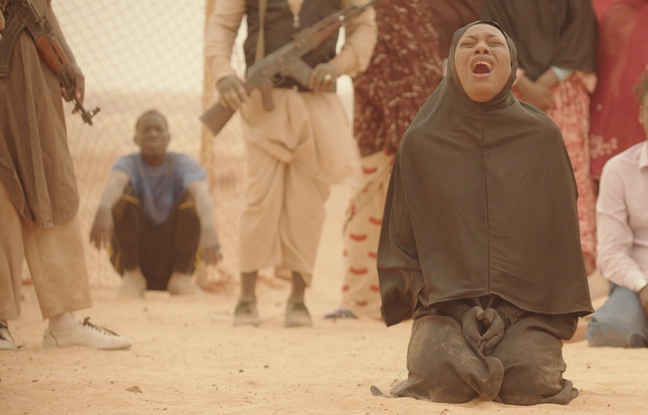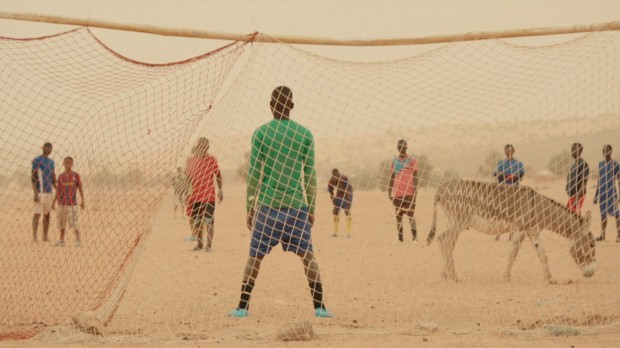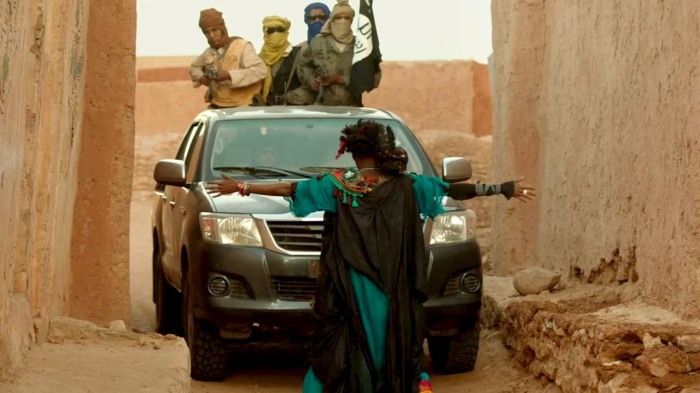
-Singing while serving 40 lashes punishment
The dramatically uprising topic of the world today. The film predominantly stigmatizes the demeaning way of governing rather than fundamentalism itself.
TITLE
The story revolves around the Malian cattleman, Kidane and his family who face wrath of Islamic fundamentalists after a tragic accident. Although there is one particular character that is centered in the plot, the subject is not him, it is about the world he lives in. It’s the blueprint of the setting that we are engaged to make the thought out of, thus the name of the city where the story occurs, “Timbuktu” is an authentic title.
INCITING INCIDENT
There are two inciting incidents. The first one originates the setting itself and prompts a number of conflict revolving unnamed characters against the world. The second one provokes the protagonist’s journey.
(1): Timbuktu goes under the occupation of Islamists. The citizens are rigorously made to obey the fundamental laws.
(2): Kidane accidentally murders a fisherman after one of his cows was killed by him.
[Parallel Plots]
We have four or five plots revolving around the unnamed characters. These scenes are never intertwined, emphasizing on the fact the world is having impact on mere individuals.

-Playing football with “an imaginary ball”
RISING ACTION
[Powerlessness & Authenticity]
The protagonist, Kidane and the citizen from each scene are utterly powerless under the governance. It was drawn to my attention that despite being intimidated by the fundamentalists, they all take rising actions. They take actions not against the authority in order to flip the dominance, but for their freedom. For instance, after football is banned, the kids still play with an imaginary ball. The most emotional scene is where the woman starts singing while she is punished by the 40 lashes after breaking the law of music ban.
It might not have been as visually entertaining as those pro-revolutionary movies where they battle against the system, but Timbuktu shows more authentically powerless rising actions that are more emotional and convincing to realism.
[Flaw of this film]
The main plot that revolves around the protagonist is ironically the least engaging. Before the accident, Kidane always lived in a manner that doesn’t upset the authority. Even the reason he goes under arrest is not absurd like the other cases. After he is sentenced to death, the MacGuffin he pursues is survival and his family. It works in a way the basic human needs are at stake, but the causality of the battle doesn’t reinforce the demeaningness of the system. Be it an accident or not, it was a murder.

-A mad woman stopping the fundamentalist
[A Mad Woman]
There is this woman who seems mentally ill. She is the only one in the story who lives overly free-spirited and the laws are not applied to her presumably due to her mental condition. There is no conflict that features with her at all. She metaphorically represents the dubious concept of sanity and insanity. This concept is like a chunk of malleable clay battled over between the states and the authorities. It has been always shaped according to the history, who won the war, act of dictatorship, the majority’s thought in democracy, and so many other affairs.
RESOLUTION
Kidane is sentenced to death. His wife shows up at his execution with a pistol, and as they run to each other the husband attempts to stop her. Mistaking this for an escape attempt, the executioners gun them both down.
with a pistol, and as they run to each other the husband attempts to stop her. Mistaking this for an escape attempt, the executioners gun them both down.
[Final Thought]
I don’t fully see this movie as anti-fundamentalist. The ultimate message can apply to any system that manipulates and abuses its people by justifying themselves to dismiss the preach of their God (or general morality), and acting as one instead . This applies to the countries like USA, Nigeria, China, Indonesia or Saudi Arabia where they still practice death penalties.